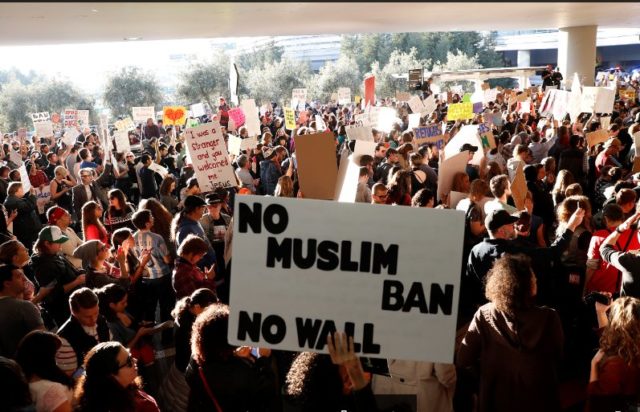Trump Ban: Refugees, Rights And the Law

NEW DELHI: Contemporary times are full of uncertainties -- particularly for the protection of refugee’s rights and human rights in the United States of America, and hence, globally. The ban on Syrian refugees and Muslims from seven nations from entry to the United States is indeed a dark time for human rights as it unfolds a humanitarian crisis on a global scale.
The U.S has been known as a land of immigrants, and multiculturalism is its national-cultural identity. Denying this multicultural reality by targeting Muslim refugees and immigrants is clear religious discrimination -- an outrageous breach of international human rights obligations and the 1951 Refugee Convention.
America is a signatory of the 1951 Refugee Convention thus legally bound to respect its obligation towards refugees, and must shelter refugees if their life is in danger. Further, refugees cannot be targeted or singled out due to their origin, race, colour and religion.
There is another dimension unfolding within this humanitarian crisis that is the unbridled and unchallenging authority of the State which consequently and simultaneously controls and restricts the rights of refugees and makes human rights regime less effective. States on the basis of their sovereignty, through immigration laws, control the entry and exit of a person including refugees and migrants within its jurisdiction.
In this context, it is clear that immigration laws are inherently discriminatory since they treat differently aliens and tourist on the basis of their origin and economic status. For example: it is easier for a European national to travel to the US compared to an Indian or African since visa rules are stricter towards citizens of poor countries. Therefore, immigration laws are discriminatory and States employ this according to their political agenda as in the US by Donald Trump to promote his hate agenda against Muslim refugees and immigrants.
Nevertheless, the real problem is not Trump and leaders who follow extreme ideologies; rather it is the unlimited power of State’s sovereignty which separates a citizen from an alien, characterizes a refugees and a migrant as unwanted and dangerous.
This is a legal fact that signing the international human rights treaties and convention is the State’s prerogative. However, it is also true that in a globalized world, the network of international civil society (and solidarity movements) and human migration has increased. Thus, no State can ignore their human rights obligation and breach international norms. If they do so, they have to face the repercussions -- naming and shaming, economic ban and isolation from world community. This has happened with North Korea and the same can occur with the US, if the latter continues demonizing religious minorities, refugees and immigrants.
There might be possibility that in the next French presidential election, extreme right wing leader Marion Le Pen is elected as president. If this happens, the US’ recent orders, as executed by President Trump, would be replicated in France. This would be a terrible scenario where families of refugees would be adversely affected; people would be further polarized on the lines of religion and nationalism creating an environment of hatred and violence in France and hence, Europe.
Donald Trump and Le Pen represent an extreme right wing ideology which can be countered effectively by challenging the unbridled sovereignty of the State, and by pressurizing States to fulfil their international human rights obligations including respecting the rights of refugees.
Until and unless State’s shed some of their national sovereignty open door policy for refugees, achieving the above goal will be a distant dream. In this age of globalization, it will be unwise for a State to assume that it is a monocultural country. In contemporary times, nearly all nations are increasingly becoming multicultural, multi-religious and multi-racial. In such a scenario, in an immigrant nation such as the US, banning refugees and migrants on account of their religion and ethnicity, is not only moral and legal blunder, but also divisive and discriminatory.



